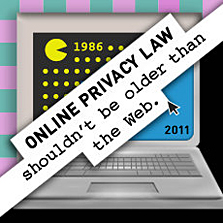
This week, our federal online privacy law turns 25. The ACLU is hosting a blog series that will address some of the many reasons why the Electronic Communications Privacy Act of 1986 (ECPA) is in need of an upgrade! Spread the word using #UpdateECPA, and to learn more about your dotRights, visit www.aclu.org/ecpa.
Back in June, Representative Jason Chaffetz (R-UT) and Senator Ron Wyden (D-OR) filed companion in the House and Senate to protect cell phone users' privacy. The "Geolocational Privacy and Surveillance Act" (GPS Act) would require law enforcement to get a warrant before they access location information. The goal is to protect privacy by preventing cell phones and other mobile devices from becoming portable tracking devices.
Soon after, Peter Welch (D-VT) joined in to cosponsor the . And only a few weeks ago a number of prominent Republicans and Democrats issued calling for full warrant protection for location information. Signatories included former federal judge and FBI Director William S. Sessions, David Keene, former Chair of the American Conservative Union and former members of Congress Asa Hutchinson (R-AR) and Mickey Edwards (R-OK).
Now just this morning, Mark Kirk from Illinois joined as the first Senate Republican cosponsor of the .
Is anyone sensing a theme here?
In a time when the evidence of partisanship is everywhere there are still issues of common ground. Location privacy and the general need to update electronic privacy are clearly such issues.
Changes in technology have resulted in a slowly evolving disconnect between the reality of law enforcement practices and our fundamental values. Americans have embraced cell phones for their convenience and extraordinary functionality. The fact that they also track a user's every movement is an unwanted side effect, sort of like privacy pollution.
"The right of the people to be secure in their persons, houses, papers and effects against unreasonable searches and seizures" is not policy of the Republican or Democratic parties; it is a unifying American ideal embodied in the Bill of Rights. That is why when it comes to cell phones, politicians from both parties have embraced location privacy, and that is why Congress should .
The federal law protecting electronic privacy is turning 25 years old this week, and unfortunately it hasn't been updated to take account of technologies like cell phones. That is why , and it's also why the ACLU has been at the forefront of efforts to make sure the government gets a warrant before tracking people — through lobbying, litigation, and forcing the disclosure of government records.
If you want to show your support for the GPS Act, !
Learn more about location tracking: Sign up for breaking news alerts, , and .


